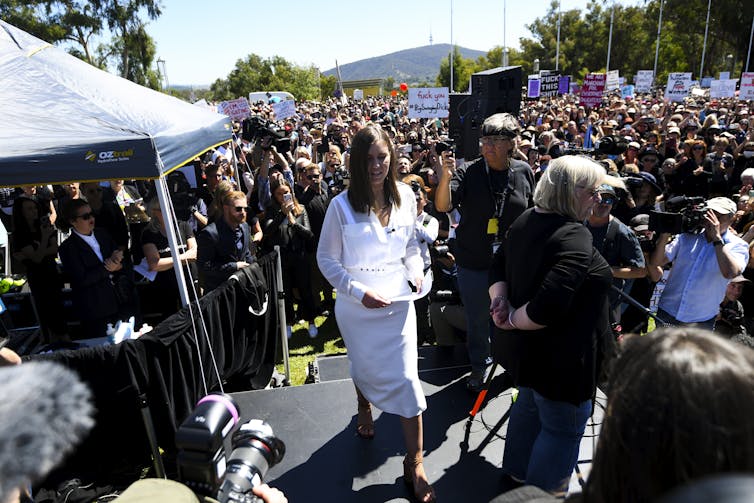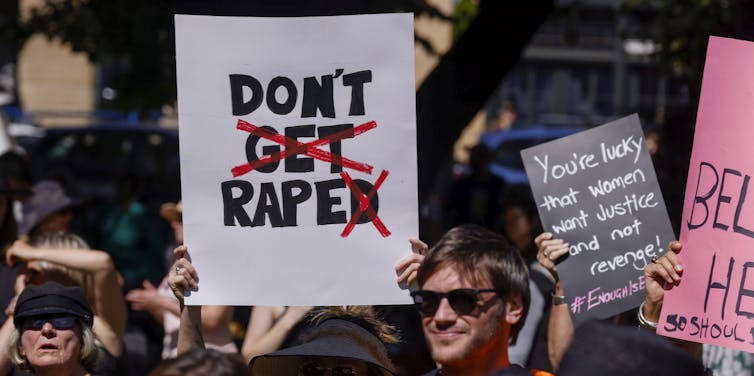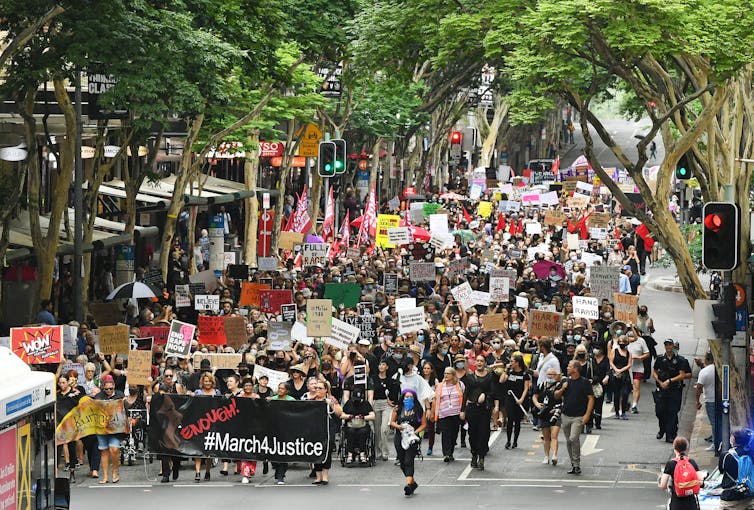Australian women are angry — and the Morrison government needs to listen
- Written by Camilla Nelson, Associate Professor in Media, University of Notre Dame Australia
Thousands of women are gathering in cities across the country, angry about the allegations of rape, sexual abuse and harassment emerging from our parliaments and schools. They’re also furious with a prime minister who’s said he’s too busy[1] to attend a rally in person to hear these concerns and would prefer a private meeting.
In Sydney, thousands of women gathered in crowds outside the town hall, spilling into the surrounding streets. They were dressed in black, waving placards: “What are you afraid of ScoMo?”, one read. “You will be held accountable,” said another. Another: “We shouldn’t need to do this.”
Lawyers were also conspicuous, some bearing the logos of prominent Sydney firms. “Lawyers for equality” their slogans read, and “We fight fair”.
Men of all ages were also there, together with First Nations sisters and members of non-binary, trans and queer communities.
Mounted police were making their presence felt at the edge of the crowd.
The mood was defiant, with the slow burning anger of women who were determined to fight for the long term. “We will not be silenced,” investigative journalist Jess Hill told the crowd. “The time for silence is over.”
“We’re marching for justice,” said another speaker. “We won’t stop marching until we have justice.”
A moment to listen
It shouldn’t be that hard for a prime minister to realise this is a moment to listen.
The powerful words[2] of Grace Tame, Australian of the Year and a child abuse survivor, have been a catalyst for longstanding rage. The rape allegations made by Brittany Higgins[3] demand attention and action. The online petition launched by former Sydney schoolgirl Chanel Contos[4], which triggered a string[5] of sexual assault allegations against students from elite boys’ schools, underscores the depth of the problem.
 Former Liberal staffer Brittany Higgins addressed the March 4 Justice rally in Canberra.
AAP Image/Lukas Coch
Former Liberal staffer Brittany Higgins addressed the March 4 Justice rally in Canberra.
AAP Image/Lukas Coch
NSW police are also investigating allegations[6] women as young as 16 were harassed in MP Craig Kelly’s electorate office by an employee (who denies the allegations and remains in his role at Kelly’s office). Allegations of sexual harassment[7] have also been tabled in the South Australian parliament.
The nation’s first law officer, Attorney-General Christian Porter, faces an allegation he raped a 16-year-old girl more than 30 years ago. He has strongly denied the allegation, but many have continued to call for an open inquiry into the claim.
By refusing to step outside the parliament to answer women’s justified concerns, the prime minister has demonstrated callous indifference. It looks like he is prioritising media management — the risk someone will snap an unflattering photograph as he embarks on his next campaign — above humanity.
Minister for Women Marise Payne drew further attention to the government’s contempt by similarly signalling her intention[8] to remain absent today.
This disregard builds on the prime minister’s already very public refusal to read the words[9] of the woman at the centre of the Christian Porter case. Morrison said[10] he discussed the claims with the accused, “who absolutely rejects these allegations”, and spoke to the Australian Federal Police commissioner and various senior public servants. Having done all that, he told[11] reporters, “there are no matters that require attention”.
In responding this way, the prime minister has generated more of the anger he hoped would disappear.
Last week at his media conference, the attorney-general asked the media to imagine “just for a second” that the allegations are not true. The women gathered at the March 4 Justice are answering that we also have a moral obligation to imagine “just for a second” that they are. What then?
A systemic culture of sexism
In Australia, up to one in five girls will be sexually asaulted[12]. Of women over 15, one in two report being sexually harassed[13]. The aged care royal commission heard there are 50 sexual assaults a week[14] in the aged care system.
I am no longer surprised to hear disclosures of sexual assault and domestic violence from my students or other women. I am only surprised when a woman claims she hasn’t been.
 The prime minister has generated more of the anger he hoped would disappear.
AAP Image/ ROB BLAKERS
The prime minister has generated more of the anger he hoped would disappear.
AAP Image/ ROB BLAKERS
Workplace sexual harassment particularly affects women in their early 20s when they are too young to have gained access to inner circles occupied by slightly older women – the places where discrete warnings against certain male colleagues are issued, but only whispered for fear of defamation suits.
The wrongness of sexual abuse has only recently – and unevenly – been recognised. But there is a terrifying contradiction between the wrongness of rape and sexual assault and harassment, the sheer prevalence with which it occurs, and the inability for women to obtain redress from the courts via the so-called “rule of law” repeatedly invoked by the prime minister.
This moment is a reckoning well beyond the Christian Porter or Brittany Higgins allegations, or the findings made against former High Court Justice Dyson Heydon[15] by a High Court inquiry.
Ending Canberra’s toxic culture is the rallying point, but women are also taking to the streets because these failures are intrinsically connected to a systemic culture of sexism in law, politics and policy-making.
 The government’s apparent inability to adequately listen or respond to the serious concerns of women suggests a deep, underlying cultural reason for its policy failures.
AAP Image/Dave Hunt
The government’s apparent inability to adequately listen or respond to the serious concerns of women suggests a deep, underlying cultural reason for its policy failures.
AAP Image/Dave Hunt
Last week, a Grattan Institute report[16] revealed women took the brunt of job losses generated by the pandemic. It also confirmed that women experienced a disproportionate share of the burden of unpaid work during lockdown, particularly the burden of home schooling. Female casual workers were also disproportionately excluded from government benefits such as JobSeeker. Meanwhile, plans for family law reform[17] due to be tabled this week[18] are likely to have dramatic impacts for survivors of domestic violence and their children.
The government’s apparent inability to adequately listen or respond to the serious concerns of women suggests a deep, underlying cultural reason for its policy failures.
The gains that older women, and women of my own generation thought we had won, seem to be evaporating. Or perhaps the real problem is that at a cultural level, they were never really won at all. And so the fight begins again.
If this article has raised issues for you, or if you’re concerned about someone you know, please call 1800RESPECT on 1800 737 732 or Lifeline on 13 11 14.
References
- ^ too busy (www.smh.com.au)
- ^ powerful words (theconversation.com)
- ^ Brittany Higgins (theconversation.com)
- ^ Chanel Contos (theconversation.com)
- ^ string (www.news.com.au)
- ^ allegations (www.abc.net.au)
- ^ Allegations of sexual harassment (www.theguardian.com)
- ^ intention (www.smh.com.au)
- ^ read the words (www.news.com.au)
- ^ said (www.news.com.au)
- ^ told (womensagenda.com.au)
- ^ one in five girls will be sexually asaulted (aifs.gov.au)
- ^ one in two report being sexually harassed (www.aihw.gov.au)
- ^ 50 sexual assaults a week (www.abc.net.au)
- ^ Dyson Heydon (theconversation.com)
- ^ report (grattan.edu.au)
- ^ family law reform (www.theguardian.com)
- ^ tabled this week (www.aph.gov.au)













